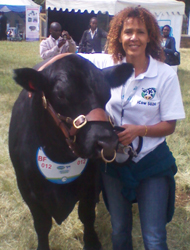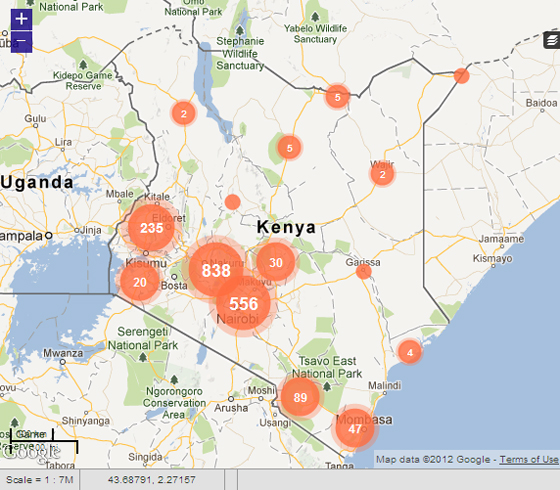
I'm Su Kahumbu Stephanou, a passionate Kenyan farmer and social entrepreneur, founder and CEO of Green Dreams Ltd and Green Dreams Tech Ltd, focused on creating solutions for smallholder farmers in Africa to give them sustainable productivity and incomes. I am especially committed to educating, encouraging and enabling young people to engage in agriculture and build a better Africa from the ground up.
Over the years of my involvement in agriculture in the organic industry in Kenya, it became very apparent to me that one of the biggest problems facing farmers was lack of information on just about every part of the agricultural value chain. To develop the supply chain for my own growing organic business, I had to find a way of teaching farmers about organic production methods. I got involved with the magazine The Organic Farmer, where I began to answer farmers' queries, which led to me getting involved with the Biovision Foundation in the development of their infonet website. This is now an incredible website offering verified agricultural information targeted at smallholder producers.
In 2010, in a quest to increase the outreach of information, I explored ways of disseminating info over mobile phones. Competitive mobile phone operator wars had resulted in a sudden drop in both user charges as well as device prices, which spurred a sudden massive growth in mobile phone use across Kenya.
My original plan was to develop a voice-based agricultural platform and whilst I was working on this, I was encouraged to enter it into the first Apps4Africa competition. The technology involved was completely foreign to me at the time and rather than rush to complete what I felt was a three year project to cover information on all areas of agriculture, I decided to enter a small component of the product, the cow calendar that I called iCow, which was made possible with help from the Indigo Trust, USAID and support through GALVmed, which receives UK aid and funding from the Bill and Melinda Gates Foundation.
iCow creates a conversation between government, agricultural stakeholders and farmers. The various features of the iCow platform offer countless opportunities above and beyond the increased milk yields and delivery of services by government. These include: early warning systems on crop and livestock diseases; essential data on productivity; or quality assurance of suppliers such as artificial inseminators by digital tracking their performance.

The role of mobile and web technology in changing lives and opening up governments
Mobile and web technology have accelerated our access to information and services which is all empowering. iCow is enabling farmers to increase their milk yields and livestock numbers as well as making government agricultural suppliers accessible to farmers across the country. It has enabled government to engage and learn from the farming sector more cost effectively, and enabled emerging country populations to leapfrog forward in critical areas of development which contribute to overall economic productivity.
Mobile money has changed the playing field in the financial sector and enabled citizens to take a bigger role in developing the economy than ever before. Mobile education, agriculture and health are just beginning to happen.
Mobile and web technology are enabling us to expand and spread knowledge in all areas - education, agriculture, health, governance - across an entire nation, quickly. The challenge is for the development tools, agencies and services to keep up with these changes. For example, farmers now need access to capital to increase their productivity based on the data they can access. The old ways of accessing finance do not work in the agricultural arena anymore. The changes in technology have brought many opportunities and new thinking and services are emerging. More are needed still.
Opportunities
My advice to donors would be for them to encourage governments to understand the changes taking place, embrace them, and enable them to grow, especially mobile money. Gvernments must also embrace advice from a younger savvier generation, and be prepared to take off their suits and get into jeans and gumboots if they want to survive the avalanche of change that has started. We also need to develop our systems to incorporate marginalised communities as it's vital that everyone can access devices and networks and information.
I believe as connectivity expands and becomes more affordable we will see increased growth across the African continent in unpredictable and exciting new ways. In particular, governments will be expected to be more accountable to citizens due to the speed at which these changes and developments are taking place. Governments are going to have to keep up and open up. Africa is on the verge of happening.
Please note, this is a guest blog. Views expressed here do not necessarily represent the views of DFID or have the support of the British Government.
 Open Up!, a conference hosted by the UK Government and Omidyar Network, will help governments use technology to open up and enable millions of citizens across the world to hold decision makers to account and change lives. Join in at www.openup12.org and #OpenUp12.
Open Up!, a conference hosted by the UK Government and Omidyar Network, will help governments use technology to open up and enable millions of citizens across the world to hold decision makers to account and change lives. Join in at www.openup12.org and #OpenUp12.

Recent Comments